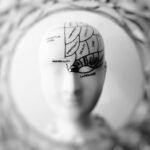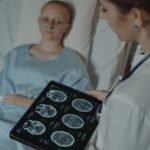Alzheimer’s disease is a progressive and degenerative brain disorder primarily affecting memory, thinking, and behaviour. It is the most common cause of dementia among older adults. Here are some key points to understand about Alzheimer’s disease:
Table of Contents
Cause of Alzheimer’s disease
The exact cause is not fully understood. However, it is believed to result from genetic, environmental, and lifestyle factors. Here are some of the critical factors that are thought to contribute to the development of Alzheimer’s disease:
- Genetics: While most cases of Alzheimer’s disease are not directly inherited, certain genetic factors can increase the risk of developing the condition. Mutations in specific genes, such as the APP, PSEN1, and PSEN2 genes. Amyloid precursor protein (APP), Presenilin 1 (PSEN1), and Presenilin 2 (PSEN2) genes cause to familial early onset Alzheimer’s disease and account for less than 1% of all Alzheimer’s patients [1]. The presence of the APOE-e4 allele is also associated with an increased risk of late-onset of the disease.
- Age: The risk of developing the disease increases with age. Most people with Alzheimer’s are 65 and older, and the risk doubles roughly every five years after age 65.
- Family History: A family history of Alzheimer’s can significantly increase your risk if multiple close relatives have been affected.
- Neurochemical and Brain Changes: Alzheimer’s is characterized by the accumulation of abnormal protein deposits in the brain, including beta-amyloid plaques and tau tangles [2]. These changes lead to the death of brain cells and the progressive loss of cognitive function.
- Vascular Factors: Cardiovascular risk factors such as hypertension, high cholesterol, and diabetes are associated with an increased risk of the disease. These conditions can affect blood flow to the brain and contribute to cognitive decline.
- Environmental Factors: certain toxins and head injuries, may contribute to the development of Alzheimer’s disease.
- Lifestyle Factors: Certain lifestyle choices, such as a sedentary lifestyle, poor diet, smoking, and excessive alcohol consumption, may increase the risk of Alzheimer’s disease.
It’s important to note that Alzheimer’s is a complex and multifactorial condition; not everyone with risk factors will develop it. Conversely, some individuals may develop Alzheimer’s disease without apparent risk factors.
Symptoms of Alzheimer’s disease:
Alzheimer’s disease is a progressive brain disorder primarily affecting memory, thinking, and behaviour. The symptoms can vary from person to person and may change over time. Common symptoms and stages of Alzheimer’s disease include:
- Some individuals with Alzheimer’s may initially experience mild cognitive impairment (MCI), which can involve problems with memory, language, or judgment. MCI does not always progress to Alzheimer’s disease, but it can be an early sign.
- One of the hallmark symptoms of Alzheimer’s is memory loss. It could be difficulty remembering recently learned information, conversations, appointments, or the names of well-known people.
- People with Alzheimer’s may struggle to complete everyday tasks like cooking, dressing, or using household appliances. They may struggle with tasks that were previously routine.
- Individuals may become disoriented and lose their sense of time and place. They need to recognize where they are or even the current date.
- Alzheimer’s can lead to problems with Communication, difficulties finding the right words, following or joining in on conversations, and writing or reading.
- People with Alzheimer’s might develop poor judgement or make poor decisions, such as giving away money to telemarketers or becoming easily victimized.
- Alzheimer’s can cause changes in Mood and Behavior, such as becoming angry, anxious, or depressed. It can also lead to changes in personality, making individuals more suspicious, fearful, or apathetic.
- A person with Alzheimer’s may become increasingly passive, withdrawing from social and work activities and losing interest in hobbies.
- Difficulty with Visual and Spatial Relationships: Problems with vision can occur, making it hard to read, judge distance, and identify colours or contrast.
- Later stages of Alzheimer’s can lead to mobility and coordination issues, making it difficult to perform tasks like walking, swallowing, and speaking.
- People with Alzheimer’s may walk away from home or get lost even in familiar places.
- In advanced stages, individuals may struggle to recognize family and close friends.
- As the disease progresses, individuals may require assistance with daily activities, including bathing, dressing, and eating.
Stages of Alzheimer’s disease:
Alzheimer’s disease is often categorized into three main stages: mild, moderate, and severe. Each stage represents a different level of cognitive and functional decline.
Alzheimer’s disease typically progresses through several stages. In the preclinical stage, abnormal brain changes occur without noticeable symptoms. Mild Cognitive Impairment (MCI) follows, involving mild cognitive changes. Mild Alzheimer’s disease brings memory and cognitive issues, followed by moderate Alzheimer’s with more pronounced symptoms. Severe Alzheimer’s is the final stage, marked by profound cognitive and functional decline, often leading to complete dependency on care.
Progression varies among individuals, and early diagnosis is essential for managing the disease’s impact. Medications and interventions can alleviate some symptoms, but a cure is unavailable. Coping with Acute Spinal Cord Injury: A Supportive Guide
Diagnosis of Alzheimer’s disease:
Diagnosing Alzheimer’s disease involves a comprehensive evaluation, as no definitive test exists for this condition. The process typically includes the following components:
- The first step is often a detailed medical history, which may include discussions with the patient and their family about the nature and progression of cognitive symptoms. A physical examination helps rule out other potential causes of cognitive decline.
- Cognitive tests assess memory, problem-solving, language skills, and other cognitive functions. Neuropsychological assessments help in evaluating the extent and nature of cognitive impairment.
- Laboratory Tests exclude other conditions with similar symptoms, such as thyroid dysfunction or vitamin deficiencies.
- Imaging techniques like MRI and PET scans can reveal structural changes in the brain and the presence of amyloid plaques and tau tangles, which are hallmarks of Alzheimer’s disease. These scans help to rule out other causes of cognitive decline.
- Sometimes, a lumbar puncture (spinal tap) may be performed to analyze cerebrospinal fluid for markers associated with Alzheimer’s, such as elevated tau levels and beta-amyloid proteins.
- Genetic tests can identify rare mutations associated with early-onset Alzheimer’s disease. However, they are less relevant for the more common late-onset form.
- Comprehensive Assessment: A thorough evaluation considers all of the above factors to make a clinical diagnosis of Alzheimer’s disease.
Early diagnosis is essential as it enables timely interventions, support, and treatment to manage symptoms and improve the patient’s quality of life. However, it’s important to note that there is no cure for Alzheimer’s disease, and available treatments primarily focus on symptom management and slowing disease progression. Read How does Multiple Sclerosis affect a person’s life?
Treatment of Alzheimer’s disease:
There is no cure for Alzheimer’s disease. However, some medications and interventions can help manage its symptoms and slow its progression. These may include cholinesterase inhibitors and NMDA receptor antagonists. Non-pharmacological approaches, such as cognitive stimulation and physical exercise, can also be beneficial.
- Some Medications are approved to manage cognitive and behavioural symptoms associated with Alzheimer’s. These include cholinesterase inhibitors (e.g., donepezil, rivastigmine, and galantamine) and memantine. These medications can help improve cognitive function and manage behavioural symptoms to some extent.
- A healthy lifestyle, including regular physical exercise, a balanced diet, and mental stimulation, can positively impact cognitive function and overall well-being.
- Non-drug approaches, such as cognitive-behavioural Therapy, can help individuals and their caregivers manage challenging behaviours and improve Communication.
- Occupational Therapy can help individuals with Alzheimer’s learn strategies to manage daily activities and enhance their independence.
- A strong support system is crucial for individuals with Alzheimer’s and their caregivers. Support groups and counselling can provide emotional support and practical advice.
Prevention of Alzheimer’s disease:
While there is no guaranteed way to prevent Alzheimer’s disease, several lifestyle choices may reduce the risk:
- Regular Physical Activity: Exercise promotes brain health and may lower the risk of cognitive decline.
- Healthy Diet: A balanced diet rich in fruits, vegetables, and omega-3 fatty acids may help.
- Mental Stimulation: Engaging in mentally stimulating activities, such as puzzles or learning new skills, can be beneficial.
- Social Engagement: Maintaining social connections and staying mentally active may reduce the risk.
- Adequate Sleep: Quality sleep is essential for brain health.
- Management of Health Conditions: Controlling diabetes and hypertension can help lower the risk.
- Moderate Alcohol and Avoid Smoking: Limit alcohol intake and avoid smoking, both linked to cognitive decline.
- Stress Reduction: Chronic stress can have a negative impact on brain health, so managing stress is essential.
Remember that genetics can also play a role. However, a healthy lifestyle generally reduces the risk of Alzheimer’s disease. Know the Diagnosis of Neurological Disorders.
Points to note:
- Alzheimer’s disease is a complex and challenging condition affecting millions worldwide.
- Family members and caregivers often play a crucial role in providing care and emotional support.
- Early detection and intervention are areas of active investigation.
- While there is no guaranteed way to prevent Alzheimer’s disease, a healthy lifestyle may reduce the risk.
- Raising awareness about the disease and advocating for research and support services is vital to address the growing public health concern posed by Alzheimer’s.
References:
- Goldman JS, Hahn SE, Catania JW, LaRusse-Eckert S, Butson MB, Rumbaugh M, Strecker MN, Roberts JS, Burke W, Mayeux R, Bird T; American College of Medical Genetics and the National Society of Genetic Counselors. Genetic counseling and testing for Alzheimer disease: joint practice guidelines of the American College of Medical Genetics and the National Society of Genetic Counselors. Genet Med. 2011 Jun;13(6):597-605. doi: 10.1097/GIM.0b013e31821d69b8. Erratum in: Genet Med. 2011 Aug;13(8):749. PMID: 21577118; PMCID: PMC3326653.
- Bloom GS. Amyloid-β and tau: the trigger and bullet in Alzheimer disease pathogenesis. JAMA Neurol. 2014 Apr;71(4):505-8. doi: 10.1001/jamaneurol.2013.5847. PMID: 24493463.
Consult a Neurologist
- Dr. Vrajesh Udani- Neurologist in Mumbai
- Dr. Zehra Husain- Neuro Surgeon at Saifee Hospital, Mumbai
- Dr. YOGESH PATIDA- Neurologist at Bhaktivedanta Hospital, Mumbai
- Dr. Vinod Rambal- Neuro Surgeon in Mumbai
- Dr. Viswanathan Iyer- Neuro Surgeon at Hiranandani Hospital, Mumbai
- Dr. VISHWANATHAN IYER- Neuro Surgeon at Kohinoor Hospital, Mumbai
- Dr. Vivek Agrawal- Neuro and Spine Surgeon at Sir H. N. Reliance Foundation Hospital, Mumbai
- DR. VINAY S. CHAUHAN- Neurologist at Lilavati Hospital, Mumbai
- Dr. Virendra Manek- Neuro Surgeon at Bhaktivedanta Hospital, Mumbai
- DR. VISHAL KUNDNANI- Spine Surgeon in Mumbai
- DR. VENKATA RAMAKRISHNA T- Spine Surgeon at Yashoda Hospitals, Secunderabad
- Dr. Vikas Gupte- Neuro & Spine Surgeon at Fortis Hospital, Mumbai
- Dr. Vibhor Pardesani- Neurologist at Wockhardt Hospital, Mumbai
- Dr. V J Laheri- Spine Surgeon at Hiranandani Hospital, Mumbai
- DR. VAMSI KRISHNA VARMA PENUMATSA- Spine Surgeon at Yashoda Hospitals, Secunderabad
Neurological Disorders
- How Cerebral Hypoxia can lead to brain damage?

- Bipolar Disorder

- Mononeuropathy

- Poliomyelitis

- Neurodegenerative disorders

- Huntington’s disease (HD)

- Cerebral edema

- Migraine

- Brain Hemorrhage

- Epilepsy

- Polyneuropathy

- Encephalitis

- Increased Intracranial Pressure

- Types of Brain Tumors You Should Know About

- Brain Stroke: Symptoms, Diagnosis and Treatment



























